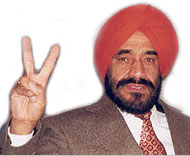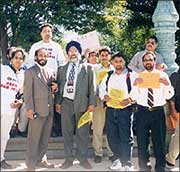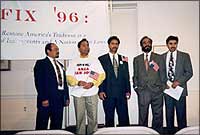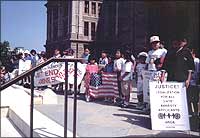The Rediff US Special/ Neil G Greene


Driving his cab through San Jose, Kirpal Bajwa shuttles customers across the Peninsula, burning gas and collecting tips. In his spare time, though, this cabbie educates and organizes immigrants from across the globe who are fighting to become legal residents of the United States.
A few months ago, many of the immigrants he's helped, gathered at the San Jose Gurudwara to celebrate some optimistic steps taken by Congress. Bajwa, in no small way, spurred the new legislation as the local chairman of the Association for Residency and Citizenship of America.
 ARCA is a national organization of immigrants.
Its members are featured in several high-profile lawsuits with the Immigration and Naturalization Service that seek to resolve late amnesty application cases. In 1986, Congress granted amnesty to about 2.6 million undocumented aliens. But 400,000 more long-time U S residents were left out of the loop.
ARCA is a national organization of immigrants.
Its members are featured in several high-profile lawsuits with the Immigration and Naturalization Service that seek to resolve late amnesty application cases. In 1986, Congress granted amnesty to about 2.6 million undocumented aliens. But 400,000 more long-time U S residents were left out of the loop.
Their amnesty application cases remain pending and the litigation has been progressing for over a decade, as many earn a living with temporary work visas. However, the long-term status of these immigrants -- who come from India, Mexico and Vietnam, among other places -- depends on the outcome.
"I used to be like so many people, surprised, asking, 'Why are our cases pending? Where are they in the process?'" says 62-year-old Bajwa, who immigrated to the United States from a small town in Punjab in 1991.
It was the uncertainty and the constant questions about the status of these cases, Bajwa says, that led him to the San Jose Gurudwara in 1998. There, he heard, people were meeting with members of the Catholic Social Services, the Center for Human Rights and the Constitutional Law Foundation, as well as various attorneys involved in INS disputes.
But Bajwa also had a deeply personal stake in the matter: Living in INS limbo himself, he couldn't visit a sick son in Punjab, or attend another's wedding. The immigrants' fight to become permanent residents was his own.
 At one weekend meeting at the gurudwara, Bajwa says, he met Peter Shey, attorney representing the CSS. Bajwa could see how hard Shey and others were working to fight for the late amnesty aliens, so he decided to match their effort himself by studying the issues and organizing immigrants.
At one weekend meeting at the gurudwara, Bajwa says, he met Peter Shey, attorney representing the CSS. Bajwa could see how hard Shey and others were working to fight for the late amnesty aliens, so he decided to match their effort himself by studying the issues and organizing immigrants.
"I went into the depth of the case, and then I knew we needed to unite," Bajwa recalls.
He began reaching out to a broad spectrum of immigrants by placing classified ads in the Peninsula's Latino publication, Nuevo Mundo, and several Punjabi papers. The ads listed a phone number aliens could call to learn about the ongoing legalization effort, and a San Jose location where they could meet to strengthen their cause.
Within a month, meeting attendance grew from a dozen members to over 50. ARCA's San Jose chapter was soon born with Kirpal Bajwa as chairman.
 Raj Sethi (not his real name) was one of the many immigrants who joined ARCA early on.
In 1998, Singh was working for Silicon Graphics, a high-tech company, when he tried to renew his work visa. He was told he would not be permitted to extend it, and that he would have to return to India.
Raj Sethi (not his real name) was one of the many immigrants who joined ARCA early on.
In 1998, Singh was working for Silicon Graphics, a high-tech company, when he tried to renew his work visa. He was told he would not be permitted to extend it, and that he would have to return to India.
"Life was going cool," Sethi says, "and then suddenly when I went to renew my work visa, they took my card and said go home." But Sethi read Bajwa's ad in a Punjabi paper and contacted him looking for a solution. After attending his first ARCA meeting, Sethi says he found a way to strengthen his case and help his fellow immigrants.
"I joined ARCA because I couldn't fight as one person. We need unity," says Sethi. "(Bajwa) is a good organizer. He's working really hard and giving input about what we're doing," he added.
With its increased membership, ARCA intensified its grassroots lobbying, sending mass e-mails and letters to Congress, holding rallies, lobbying the White House and ultimately visiting Washington, DC. During half a dozen trips to the capital, Bajwa and other ARCA members personally explained the plight of the nearly 400,000 late amnesty immigrants to Congress and then-president, Bill Clinton's chief of staff, John Podesta.
"We had meetings on Capital Hill and we went door to door speaking to the senators," Sethi recalls. "We told them we desperately need work, legal work, because we don't want to be illegal. It's very hard to be illegal."
Their collective efforts would soon bear fruit.
It was in November of 2000 that the CSS won an appeal in federal district court in Sacramento, giving late amnesty applicants a glimmer of hope.
 And while no legal wheels have been set in motion as of yet, the legalization tide appears to be in the immigrants' favor since Congress subsequently passed the Legal Immigration and Family Equity Act, LIFE, on December 15, 2000, which Clinton signed a week later.
And while no legal wheels have been set in motion as of yet, the legalization tide appears to be in the immigrants' favor since Congress subsequently passed the Legal Immigration and Family Equity Act, LIFE, on December 15, 2000, which Clinton signed a week later.
As a result of the bill, Congress has given the INS until April 20 to develop a processing system for the late amnesty cases. Under the LIFE act, many of the late amnesty applicants are to be registered for permanent residency once the procedure has been established by the INS. The immigrants also have one year to apply.
But Bajwa isn't satisfied.
"Late amnesty applicants got what they wanted, but ARCA didn't," he observes. "We think about all immigrants. We're interested in community members who are illegal, and we've got to keep this group active and get other people interested to work and fight together."
Design: Dominic Xavier
Back to
top
Tell
us what you think of this feature